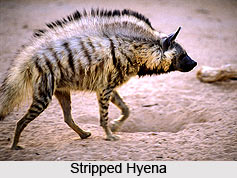 The Indian striped hyena (Hyaena hyaena) is a prominent
member of the Hyaenidae family, primarily found across the Indian subcontinent.
This species is distinguished by its unique physical features and specific
habitat preferences.
The Indian striped hyena (Hyaena hyaena) is a prominent
member of the Hyaenidae family, primarily found across the Indian subcontinent.
This species is distinguished by its unique physical features and specific
habitat preferences. Physical Features
The Indian striped hyena is a medium-sized carnivore, typically measuring between 100 to 120 centimeters in length, with a tail adding an additional 30 to 40 centimeters. The height at the shoulder ranges from 65 to 80 centimeters, and adults generally weigh between 25 to 40 kilograms. This hyena is easily recognizable by its long, coarse fur which is predominantly grey or beige, marked with distinctive black stripes running vertically along its body. The mane, which runs from the neck to the back, stands erect when the animal is agitated or feels threatened, giving it a larger and more intimidating appearance.
One of the notable features of the striped hyena is its robust skull and powerful jaw muscles, designed to crush bones. This capability allows it to efficiently scavenge and consume carcasses, including bones and hooves, which many other predators cannot process. Its forelimbs are notably stronger and longer than the hind limbs, contributing to its characteristic sloping back and giving it a more hunched appearance.
Habitat
The Indian striped hyena occupies a variety of habitats, including arid regions, scrub forests, savannas, and grasslands. It shows a remarkable adaptability to different environments, ranging from the semi-desert regions of Rajasthan to the lush forests of central India. These hyenas prefer areas with abundant shelter, such as caves, rocky crevices, and dense vegetation, which offer protection during the daytime when they are inactive. They are primarily nocturnal and are seldom seen during the day.
Water availability is not a strict requirement for the striped hyena, as it can survive in areas with limited water sources. This resilience to arid conditions is supported by its diet, which includes moisture-rich food items that help sustain it without frequent need for drinking water.
Concentration in India
The striped hyena's distribution in India is widespread but fragmented due to habitat loss and human encroachment. Significant populations are found in the states of Rajasthan, Gujarat, Madhya Pradesh, Maharashtra, and parts of Uttar Pradesh. In Rajasthan, the Thar Desert provides an ideal environment with its sparse vegetation and rocky terrain. Gujarat's Gir National Park, known primarily for its Asiatic lions, also supports a notable population of striped hyenas.
Central India's forests, particularly in Madhya Pradesh, serve as another critical habitat. These areas offer ample prey and suitable denning sites. Maharashtra, especially in regions like the Deccan Plateau, provides an environment where these hyenas can thrive amidst the varied topography. In Uttar Pradesh, the Chambal River basin and surrounding ravines offer a unique landscape that supports a healthy population of this species.
Conservation Status
The Indian striped hyena is classified as Near Threatened on the IUCN Red List due to habitat destruction, poisoning, and hunting pressures. Conservation efforts are essential to mitigate these threats and ensure the survival of this significant species in Indian flora and fauna. Protected areas and wildlife sanctuaries play a crucial role in providing safe habitats. Additionally, awareness and education initiatives aimed at local communities help reduce human-wildlife conflicts and promote coexistence.
The Indian striped hyena is a remarkable species with unique
physical adaptations and a wide but fragmented distribution across India.
Protecting this species requires concerted conservation efforts and habitat
management to address the challenges it faces in the wild. Understanding and
preserving the striped hyena's role in the ecosystem is vital for maintaining
the ecological balance and biodiversity of the regions it inhabits.